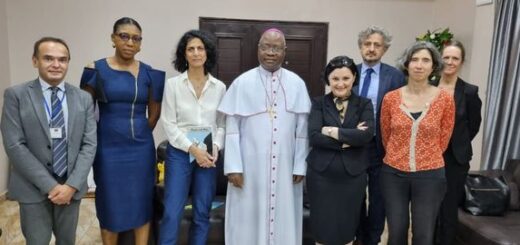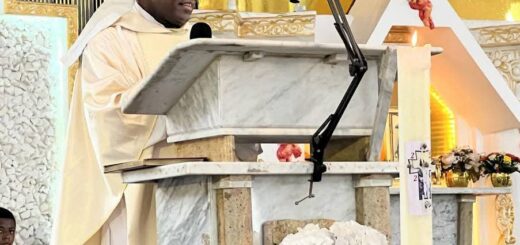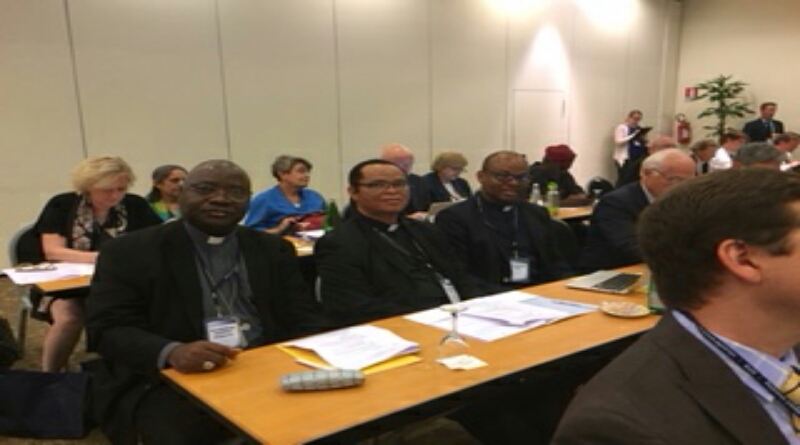Mending strained relationships through dialogue and forgiveness
by ARCH BISHOP · September 10, 2023
Opening Mass, 2nd Plenary of the Catholic Bishops Conference of Nigeria (CBCN), Holy Trinity Church, Maitama, Abuja, 10th September, 2023. Homily by Archbishop I. A. Kaigama.
Readings: Ezekiel 33:7-9; Romans 13:8-10; Matthew 18:15-20
Mending strained relationships through dialogue and forgiveness
In the name of the Bishops, Priests, Religious and Lay Faithful of Gboko, Lokoja, Otukpo, Makurdi, Lafia, Idah, Katsina Ala and Abuja, who make up the Ecclesiastical Province of Abuja, I heartily welcome the Catholic Bishops to our 2nd CBCN plenary of 2023. Please pray for and bless the good people of our Province who made this hosting possible, especially the many who prayed and donated funds. Bless also the Local Organizing Committee ably led by Fr. John Uluoma; also bless Sir Gabriel Agada, the owner of Chida International Hotel, where our events are taking place, for discounting some costs for us.
I look forward to our praying in unison as Bishops, our hearty conversations over meals, and the animated exchange that goes on in the conference hall, reflecting the situations in our dioceses and geopolitical zones. In a spirit of synodality we shall listen to and learn from one another and explore ways of meeting the spiritual and pastoral needs of our people as well as some of their social needs in these tough and challenging times.
Today, as we celebrate the 23rd Sunday, Jesus speaks to us in Matthew’s Gospel 18:15-20 about the importance of reconciliation and unity. He teaches us that when conflicts arise, as they often do in our country, we should approach one another with humility and love, seeking an amicable resolution. Our society is still grappling with divisions fueled by ethnic tensions, economic disparities and very sadly, the abuse of religious loyalties. Nigerians are therefore called to reach out across ethnic, political, and religious lines to bridge the gaps that have been created; to heal wounds and to reconcile differences.
Today there are many victims of violent conflicts; people sacked from their homes due to the nefarious activities of terrorists, bandits, kidnappers (only three days ago in Sabon Kawu, Abuja, 15 people were kidnapped, including a major seminarian, and still unaccounted for, and the next day, bandits burnt the parish house in Fadan Kamantan of Kafanchan Catholic Diocese) with Nanmaan Stephen, a major seminarian, trapped and killed inside. Our faith remains a guiding light just as the Psalmist reminds us in Psalm 145:18 that “the Lord is near to all who call upon him.”
Our faith, however, should never be an excuse for being passive. It should empower us to act positively, seeking solutions to the multidimensional problems our nation faces. We must try to reach out to those in need, as we remember the words of our Lord: “Whatever you did to one of these least brothers of mine, you did it to me” (Mt. 25:40). For now, those many brothers and sisters who are hungry, sick, feeling very insecure and quite frustrated, badly need anyone who can just offer a glimmer of hope. As the word “palliative” once again makes a return to the repertoire of our national vocabulary, we call on leaders at all levels to ensure that what is meant for the hungry poor truly reaches the hungry poor.
I call on Nigerians to face the real problems that confront us and stop firing religious missiles, using religion as a weapon of violence, or even taking life at the slightest provocation. Those religious leaders who make inflammatory statements in videos on social media should be cautioned by the appropriate authorities. Our Christian and Islamic bodies rather than engaging in offensive or defensive rhetorics or threats should always preach the need for holiness, peaceful coexistence, compassion, good neighbourliness, rather than encouraging the use of verbal or physical violence.
It was wise that we did not embark in a war in neighbouring Niger. War is worse than HIV, Ebola, COVID-19 and Malaria put together. ECOWAS should realize that the people of this region have seen endless bloodshed. It would be unwise to add to the stories of guns, bombs, and human casualty. We should be able to win peace through dialogue without firing a shot.
In the first reading, the Lord appoints Ezekiel as a watchman over the house of Israel. As the prophet Ezekiel was appointed watchman over Israel, so Jesus in the gospel reading establishes His disciples as guardians of the new Israel, the Church (cf. Mt. 18:17). Similarly, Christians and citizens of Nigeria are called to be watchful and proactive in speaking out against injustice, advocating for the marginalized and working tirelessly for the common good; condemning corruption or criminality even if our illustrious sons or the youth of our ethnic or religious groups are involved.
The high rate of poverty and unemployment is why anyone elected a Councillor, a Member of House of Assembly, a Member of the National Assembly, Governor, President or appointed a Minister is expected to carry the whole material burdens of their village, relations, and friends; and it also explains why people become hysterical in celebrating the appointment of a high-profile personality from among one of theirs.
When a visitor arrives in Abuja and drives into the heart of the city, such a visitor is greeted by fine and well-tarred roads, bright streetlights from the airport to the city centre. The city is adorned by beautiful buildings, and flyovers.
This scenery could be termed the tourist image of Abuja. The other face of Abuja reveals an astonishing contrast to the city: crowded shanty towns with very bad roads and the absence of social amenities. Some Bishops will experience a bit of this on Wednesday as we have requested that you kindly visit 27 out of the 60 pastoral Areas (quasi parishes) we created in the last two to three years. Many of these areas inhabited by the original inhabitants of Abuja, namely, Gbagyi, Basa, Gado, Koro, Gwandara, Ganagana and Afo, are where job seekers who have left their homes to get a means of existence in Abuja live. It is saddening also to learn that buildings especially occupied by these poor people suffer the fate of demolition without first taking adequate measures to give them alternative accommodation.
Abuja Archdiocese needs to build up the 60 new pastoral areas created most of which have no land, no Church structures or parish houses. The Archdiocese in a five-year development plan is targeting the construction of 12 new projects, including the continuation of work on the new Cathedral, building an Archdiocesan secretariat, catechetical training centre, spiritual year seminary, the Archbishop’s house, etc. It may sound strange if you hear that we are depending mainly on collections and bazaars; Abuja Archdiocese needs your assistance.
I wish the Catholic Bishops of Nigeria a happy and spirit-filled deliberation. I pray that through the intercession of Mary, our Mother, Nigerians will cultivate the culture of dying to self as St. Paul reminds us in Romans 6:6. This will result in the rebirth of our nation, a Nigeria where atrocities of terrorism, banditry, kidnapping, maiming, population displacements and disruption of socio-economic activities in the already hard economy, will give way to security and progress.
I wish to thank the parishioners of Holy Trinity Parish, Maitama, for hosting this opening liturgy. You are always ready to bail the Archdiocese in critical moments. May the second plenary conference beginning in your Church of the Holy Trinity yield an abundance of fruits for our Church and society, and may the collective blessings of the Bishops on Holy Trinity Parish, our Archdiocese and Province be a source of immeasurable graces upon us, through Christ our Lord.




